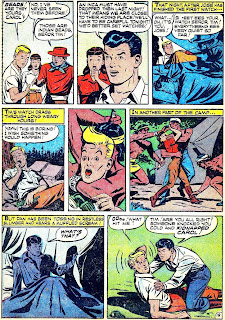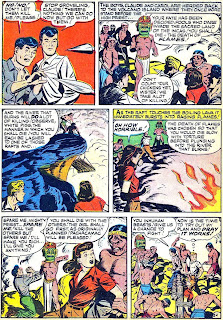
Number 870
The Dover Boys
Goodbye, 2010! Tomorrow morning we wake up, bleary-eyed and cotton-mouthed, to the second decade of the 21st Century. It's been an eventful first decade, that's for sure.
We wrap up the decade here at Pappy's with an obscure comic from the folks at Archie, Adventures of The Dover Boys #1, from 1950. The title is a knock-off of a popular series of boys' books from the early part of the 20th Century, The Rover Boys, who did their roving from 1899 to 1926 in thirty novels written by Edward E. Stratemeyer, using the pen-name Arthur M. Winfield.
I haven't read any of the original Rover Boys novels, but have read many books from Stratemeyer's syndicate, as a boy supplementing my comic book reading with the Hardy Boys and Tom Swift Jr. books. I'm not sure the comic book Dover Boys lasted only two issues because it didn't sell, or was a little too close to the original title for the Stratemeyer syndicate. By 1950 with founder Edward Stratemeyer dead, his company was run by his daughters. It was still doing well, even with the competition for juvenile readers tipped toward comic books.
 Adventures of the Dover Boys is drawn by Harry Lucey.
Adventures of the Dover Boys is drawn by Harry Lucey.Happy New Year, and I hope we'll see each other in 2011.
































5 comments:
It is a distinctly bad sign when the narrative insists, ex post, “excitement mounts to fever pitch!”
I'd call the Barnum-styled captions in The Dover Boys to be in the same kind of old-school ad copywriting as the hyperbole of ACG editor Richard E. Hughes: ". . . scream-packed all-Herbie issue!" "Funniest story in 27 1/2 years!" (Both quotes from covers of Herbie.
And yes, it doesn't portend well for the actual thrills induced by such a story to be told how you'll react when reading it.
I see it has nothing to do with Chuck Jones' well-known cartoon "The Dover Boys in Old P.U."
Stratemeyer produced two Rover Boys series; the second, published in the 1920s, dealt with the sons of the original characters.
And Richard Hughes' style of ballyhoo tended to rival Stan Lee's - he enjoyed telling us how much we'd "gasp" at his stories (I guess a yawn could be mistaken for a gasp).
Yes, but while Hughes, Lee, and Schwartz frequently used to promise reäctions that just wouldn't occur, at 5:6 the writer has the audacity to describe a reäction that hadn't occurred.
Never heard of this one Paps, lovin' the artwork lots!!
Post a Comment